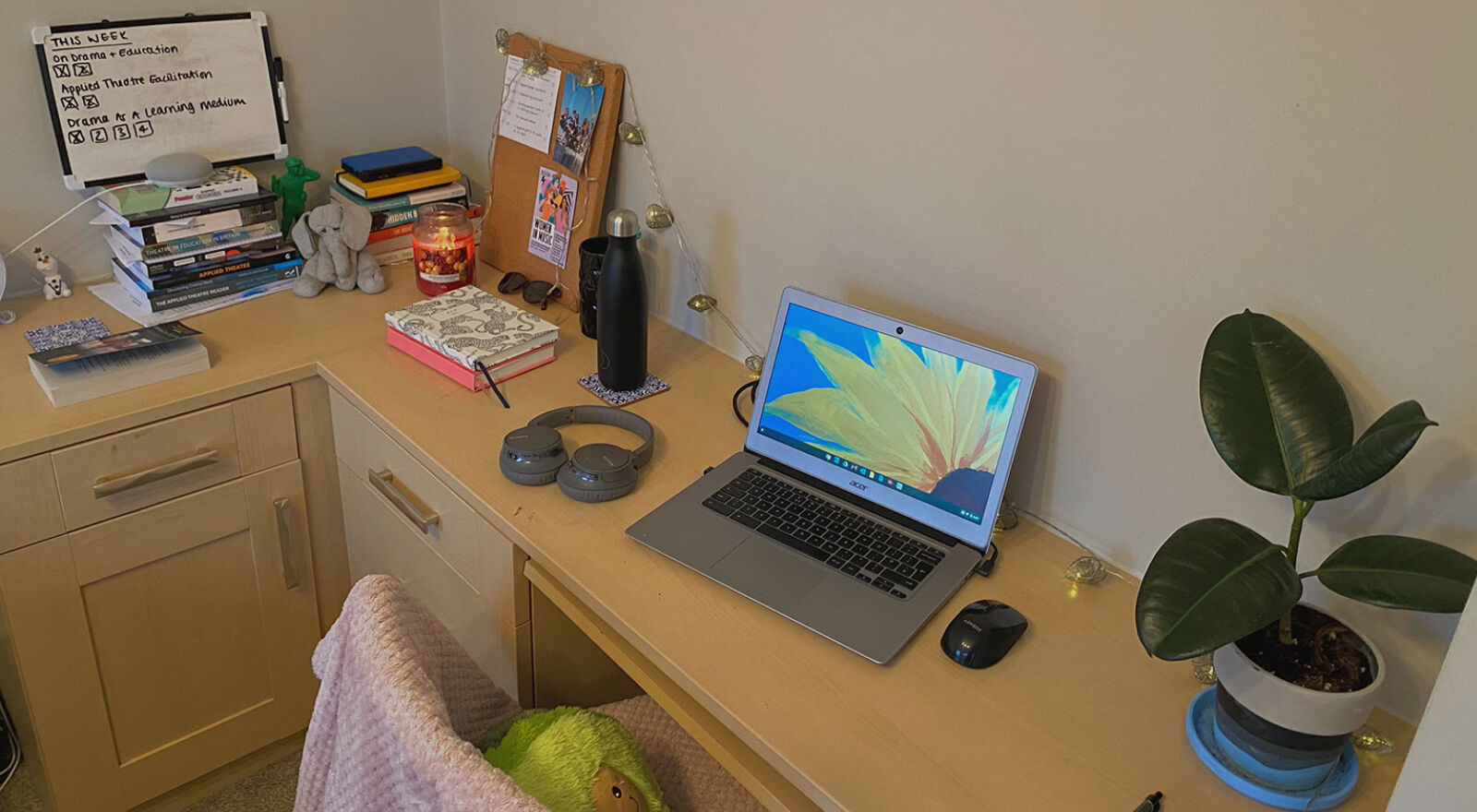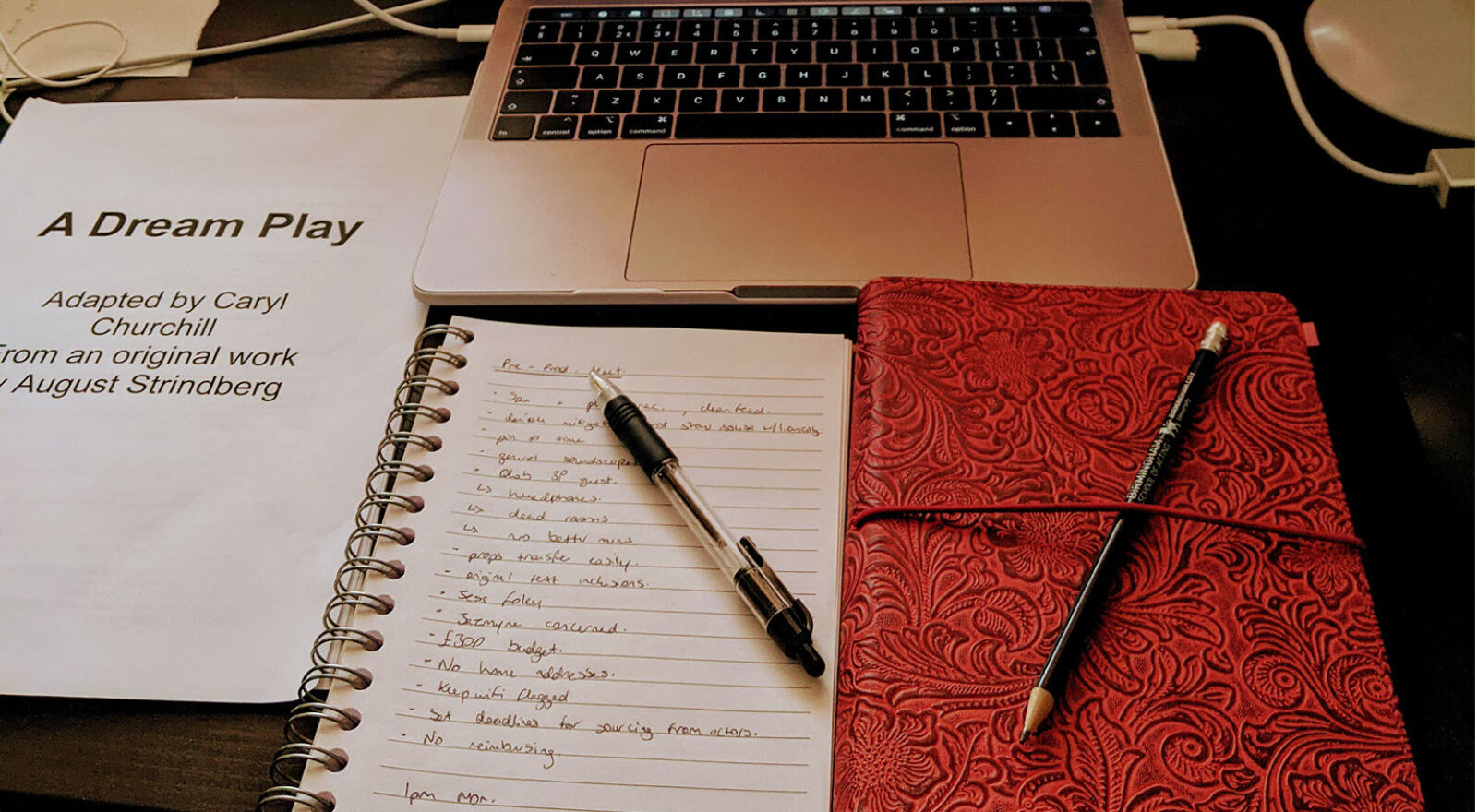Nadav Burstein BA Acting student, Hollie Westwood BA Applied Theatre student and Myra Bonnici BA Stage Management student, all study within the School of Acting. Each of them reflects on their academic experiences during Covid; how their studies have been affected, the challenges they have faced, and how they have adapted to change with the times.
Nadav Burstein, BA Acting student
“Great theatre is about challenging how we think and encouraging us to fantasize about a world we aspire to.” – Willem Dafoe
If you were to ask me a year ago today if I think that studying theatre online is possible, my answer to you would be that that’s a ridiculous idea and an absurd question.
Then, the world changed a bit. From last March, we all have had to adapt to a new temporary normal, reprograming our habits, relearning things about our society and about ourselves. This weird virus taught us how much we value hugs, a late-night conversation over the pub counter or how great it is being tired after a long day in the studio.
In a time that made us, theatre people, and art people in general, feel like this might be the end of us, seeing so many professionals lose their jobs, theatres close, and insufficient support to the arts being a common phenomenon. But it also made us remember how strong we are. And no matter how some people who are in power are ignorant to the importance of a story - stories, really, is all we have. And so for me, it just made me want it more. If theatre is there, we will do it. If it’s in danger of not being there? By God, we will do it even more.
And like Willem Dafoe said, great theatre is about challenges and creating a world that isn’t there. Over the last few months, learning online has had many challenges: technically and emotionally. Sitting in front of a screen for multiple hours a day is definitely a challenge, especially when our craft is all about the human connection. Theatre is about the coming together of things. But it’s also about overcoming obstacles. Working on a rehearsal exercise of William Shakespeare’s Pericles through Microsoft Teams is something even the most mad prophet couldn’t have seen coming, and yet, somehow, sixteen people in little slots on a screen, that were around more than four continents, managed to bring a story to life.
Instead of focusing on physical movements and the use of the body, we had to rely on careful listening, working on the voice, and mainly – improvising. Improvising day to day, from how the teachers are going to get the content that we need, to how to film a scene with improvised lighting and the sound of construction work from the building across the street.
I had to learn how to motivate myself. Waking in the morning, working all day in the same space, I had to make sure I do the work, not because someone makes sure I do, but because I want to, because I care about the work. The demanding hours of working online pushed me to find a way to keep me balanced, a way out of the screen. For me, being in my hometown, Tel-Aviv in the first lockdown, I found myself managing to fit a bike ride just to look at the Mediterranean Sea, even on a half an hour break between a voice class and an acting technique. I reminded myself of what I value and how life is unpredictable. Even if things are tough, what you always have, is yourself. Motivation is there if you look for it, and theatre can’t be defeated by any virus. Theatre lives on, and we will be back in our studios, and we’ll have new, old, important and exciting stories to tell.
Hollie Westwood, BA Applied Theatre student
When we first went into lockdown and most students retreated back to their hometowns, working online was honestly quite difficult. Students and lecturers alike had to adjust quickly to the new way of working - figuring out what is and isn’t possible in a virtual rehearsal space (and learning the importance of the mute button). But within a few weeks, we’d put together our first-year performance project: The Dust. The project went from being a live end-on performance to a digital production with audio, poetry, video and photography. It was difficult, but given the circumstances, we’re all pretty proud of the final piece.
Since September, we’ve had something a little closer to normality which our tutors worked hard for. We still have in-person teaching every week, unlike my flatmates. We are still able to do movement, voice and singing lessons with some adaptions: social distancing is required, mask-wearing is encouraged and singing lessons are now 1:1. Luckily, the changes to in-person teaching have been quite easy to follow as they’re no different from the rules in places like shops and bars. We have had a few online lectures, but they have only been used when absolutely necessary. I’ll admit that online lectures still feel strange, but our tutors understand this and give us opportunities to have breaks and try to include as much “doing” as they can so we’re not just sat in front of our screens. Adapting to these new ways of working has been an interesting learning curve. I have a new appreciation of tools like Google Docs which we’ve used to collectively write scripts when we can’t all be in the studio together, and our Facebook group chat which we use for getting messages quickly out to the whole year.
The biggest difficulty we have faced on the Applied Theatre course is the challenge of being able to work with communities and within education settings. We would usually do one of our second-year modules, Drama for Learning 2, off-campus at Safeside (a service run by West Midlands Fire Service to educate young people about fire safety among other risks) facilitating workshops with school groups. This year, we haven’t been able to work off-campus so the module has been adapted to work online. Instead of being assessed on how we lead in-person workshops, we are developing our own digital workshops which we will deliver to our classmates on Zoom in February. Despite the initial disappointment, we are making the most of the opportunity to learn how to facilitate workshops online - a skill which will be valuable even post-pandemic.
The support we have received from our tutors has been really appreciated. Our personal tutor, Bobby, has helped students make decisions about travelling home versus staying on-campus during the November lockdown. For those of us who chose not to attend an in-person session during those weeks, the course staff have done a really good job of helping us to stay involved by streaming lessons and running separate digital ones. Staff have kept in conversation with us about what we think works well online and what we need from them - this has been reassuring and means we’ve managed to make the best out of a bad situation.

Myra Bonnici, BA Stage Management student
When the government announced that we would be going into lockdown I was in the middle of programming my final video edits on QLab before the dress rehearsal for third-year BA Acting’s Nosferatu at The Old Rep Theatre. We recorded the dress run for posterity and were sadly released from our duties and told to pack our personal belongings as we would not be opening the next day.
Following that announcement, we started the rollercoaster that has been working within theatre in a Covid world. As a stage management student having the ability to adapt and improvise is a major skill in your toolkit, this year it proved to be absolutely indispensable. Needless to say, things changed, lectures were transferred online, practical tasks were postponed or reimagined and my little home office became my permanent workstation, but the course staff and students banded together to make the most out of an unfortunate situation. We learned how to use new software we wouldn’t have considered otherwise like OBS and LxFree, we adapted entire projects that had been in the works for months in a matter of days and really embraced adversity to create something of value.
Starting this academic year was quite strange but really put our priorities into perspective and brought forward better ways of working that we can now apply in future. I live out of the city and have a fairly lengthy commute, so I greatly appreciate 30-minute production meetings being on Teams as opposed to travelling all the way to Birmingham. Another resounding positive arose from our first season of third-year shows in which I was part of a four-person technical assistant team for three shows where we successfully rehearsed and live-streamed performances to our online audiences. Social distancing and other Covid-safe measures were paramount in keeping everyone protected, and we were incredibly lucky to be in a theatre again. This meant my family, who live abroad, could watch my work and if we didn't have the necessity to stream, they wouldn’t have been able to. It was an incredibly rewarding experience that gave me confidence in my own abilities thanks to supportive tutors and designers and now I have valuable skills in what will definitely be indicative of theatre’s future as an industry.
My current project is the second-year BA Acting Workshops of which I am Stage Manager for 'A Dream Play'. The current lockdown once again necessitated some creative applications, and we intend to present a radio play instead of a traditional theatre piece. With the growing market for audiobooks, podcasts and the need for remotely recorded material this adds strings to our bow as a production team and broadens our creative perspective.
On a personal note, this pandemic has affected my private life quite considerably. The tutors have been incredibly understanding and accommodating when they were able, to ensure my education and wellbeing doesn't suffer. Despite some pretty harsh lows my university experience so far has been an overwhelmingly positive one, the pandemic has taught us how to be resilient, creative, problem solvers.

Conservatoire Courses
Find out more about our courses





